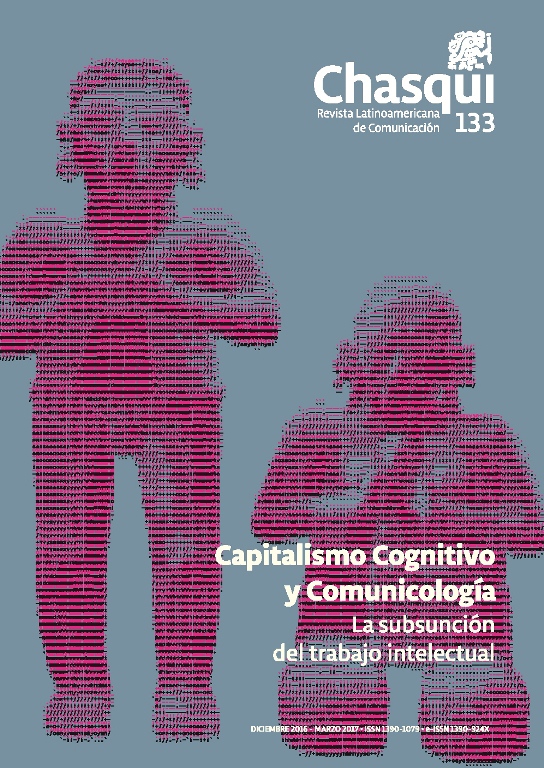The Google Books case: fair uses and/or copy privileges?
DOI:
https://doi.org/10.16921/chasqui.v0i133.2939Keywords:
copyright, fair use, Google Books, Authors Guild, librariesAbstract
In April 2016, after 11 years of judicial tensions between Google Inc. and the Authors Guild, the Google Books case reached a final court ruling in the United States. The Court of Appeal found that the copy of millions of intellectual works from the private domain −done by Google Inc. and several libraries− should be interpreted as fair use and, therefore, nothing should be compensated to the authors and rights holders. The main arguments of this ruling are analyzed in the article: what interests were represented and how the copyright was interpreted? The article retakes and deepens a broader research on common goods and distribution of the humanity intellectual wealth.References
Assange, J. (2014). Wikileaks: When Google Met Wikileaks. New York: OR Books.
Authors Guild vs. Google Inc. (2015, 31 de diciembre). Petition for Writ of Certiorari, Supreme Court of the United States. Recuperado de http://bit.ly/1UisFKU.
Authors Guild vs. Google Inc. (2014, 7 de abril). Appeal Brief. U. S. Court of Appeals, Second Circuit. Recuperado de http://bit.ly/2hlPL9p.
Brandt, R. (2010). Las dos caras de Google. Barcelona: Editorial Viceversa.
Brin, S. (2009, 08 de octubre). A Library to Last Forever. New York Times. Recuperado de http://nyti.ms/2hvVaZn.
Esteve, A. (2010). Análisis legal del proyecto Google books desde la perspectiva de los derechos de propiedad intelectual. Bid. Textos Universitarios de Biblioteconomía y Documentación, Número 24, junio 2010, Universidad de Barcelona. Recuperado de http://bid.ub.edu/24/esteve2.htm
Jain, A., Sahasranaman, V.; Saxena, S. & Chaudhury, K. (2010, 13 de agosto). Segmenting Printed Media Pages Into Articles. USPTO, solicitud de patente Nº 191120.
Google Books. (n.d.) Library Partners. Sitio web de Google Books. Disponible en http://bit.ly/2hlMXcq.
Herrera Sierra, L. F. (2015). La doctrina del fair use frente a los retos impuestos por el entorno digital. Estudio del caso google books. Revista La Propiedad Inmaterial. Nº 20, Universidad Externado de Colombia. (57 - 83). Recuperado de http://bit.ly/2gB8vOk.
Lessig, L. (2006a). Code: Version 2.0. Nueva York: Basic Books.
Lessig, L. (2006b, 15 de enero). Is Google Book Search “Fair Use”? YouTube. Recuperado de http://bit.ly/2h0K5P7.
Lefevere, F. M, Saric, M. (2004, 13 de septiembre). Detection of grooves in scanned images, USPTO, 7,508,978.
Leval, P. (1990). Toward a Fair Use Standard. Publicado en ‘Harvard Law Review’, Vol. 103. (1105 - 1136). Cambridge: EE.UU. Recuperado de http://bit.ly/2hw2VhO.
Lewis, B. (Director) (2013). ‘Google and the World Brain’. USA: Polar Star Films & BLTV Disponible en http://www.worldbrainthefilm.com/es
Na, N. (2007). Testing the Boundaries of Copyright Protection: The Google Books Library Project and the Fair Use Doctrine. Cornell Journal of Law and Public Policy, Volumen 16, Numero 2, (417-448). Recuperado de http://bit.ly/2hFoZtE.
O’Sullivan, J. K., Proudfoot, A. R., Uhlik, C. R. (2003, 30 de junio). Pacing and error monitoring of manual page turning operator. USPTO, 7,619,784.
Rosenthal, J. (2016). Google Books: Fair to Whom? IPPro The Internet (28 – 32). Londres, Reino Unido. Recuperado de http://bit.ly/24Tsnnl.
Samuelson, P. (2010). Google Book Search and the Future of Books in Cyberspace. Minnesota Law Review. Recuperado de http://ssrn.com/abstract=1535067
Sullivan, M. (2016, 3 de marzo). Google Takes Books Through The Looking Glass With Augmented Reality. FastCompany. Disponible en: http://bit.ly/1WZiCvw.
U.S. District Court (2011). 770 F. Supp. 2d 666, 679-680, filed 03/22/12: 48 páginas. Recuperado de http://bit.ly/2hlVYlK.
U.S. District Court (2013). Case 1:05-cv-08136-DC. Document 1088, filed 14/11/13: 30 páginas. Disponible en http://bit.ly/2hlTRP5.
U.S. Court of Appeals (2015). The Authors Guild v. Google Inc. Docket No. 13-4829- cv. Decided: October 16. 48 páginas. Recuperado de http://bit.ly/2hvZRT3.
U.S. Supreme Court (2016a). The Authors Guild, et al., Petitioners v. Google, Inc., No. 15-849, 18/04/16: página web. Recuperado de http://bit.ly/2hNZhiB. U.S. Supreme Court (2016b). ORDER LIST: 578 U.S.: ORDERS IN PENDING CASES, 18/04/16: 19 páginas. Recuperado de http://bit.ly/2hwTVJM.
Vaidhyanathan, S. (2011). The googlization of everything (And Why We Should Worry). Los Ángeles. University of California.
Vercelli, A. & Thomas, H. (2007). La co-construcción de tecnologías y regulaciones: análisis socio-técnico de un artefacto anti-copia de Sony- BMG. Revista Espacios, 3, 5-30.
Vercelli, A. (2009). Repensando los bienes intelectuales comunes: análisis socio-técnico sobre el proceso de co-construcción entre las regulaciones de derecho de autor y derecho de copia y las tecnologías digitales para su gestión. Disponible en http://www.arielvercelli.org/rlbic.pdf
Vercelli, A. (2010).Google Books y los cambios en las industrias editoriales. Cuadernos de Políticas Culturales: Indicadores Culturales 2010, julio de 2011, pps. 126 a 137. Buenos Aires: UNTREF.
Vercelli, A. (2015). Google Books, asimetrías jurídicas y privilegios de copia: análisis socio-técnico sobre las tensiones entre acceder y/o disponer de la herencia cultural. Revista Espacios, Volumen 36, Número 22, pág. 22; Caracas, Venezuela. Recuperado de http://bit.ly/2hFvHAa.
Xalabarder, R. (2014). Google Books and Fair Use: A Tale of Two Copyrights?. JIPITEC, Vol. 5. Recuperado de http://bit.ly/2hO1zhL.
Wu, T. (2015, 11 de setiembre). What Ever Happened to Google Books? Revista NewYorker. Recuperado de http://bit.ly/1ilsH8s.
Zeitchik, S. (2003, 27 de octubre). The Amazoning of Google? Search Firm Looks for Book Content. Web de Publishers Weekly. Recuperado de http://bit.ly/2hNZtyj.
Downloads
Published
Issue
Section
License
- Authors retain copyright and grant the journal right of first publication with the work simultaneously licensed under a Creative Commons Attribution-NoDerivs License (CC BY-ND) that allows others to share the work with an acknowledgement of the work's authorship and initial publication in this journal.
- Authors are able to enter into separate, additional contractual arrangements for the non-exclusive distribution of the journal's published version of the work (e.g., post it to an institutional repository or publish it in a book), with an acknowledgement of its initial publication in this journal.
- Authors are permitted and encouraged to post their work online.

